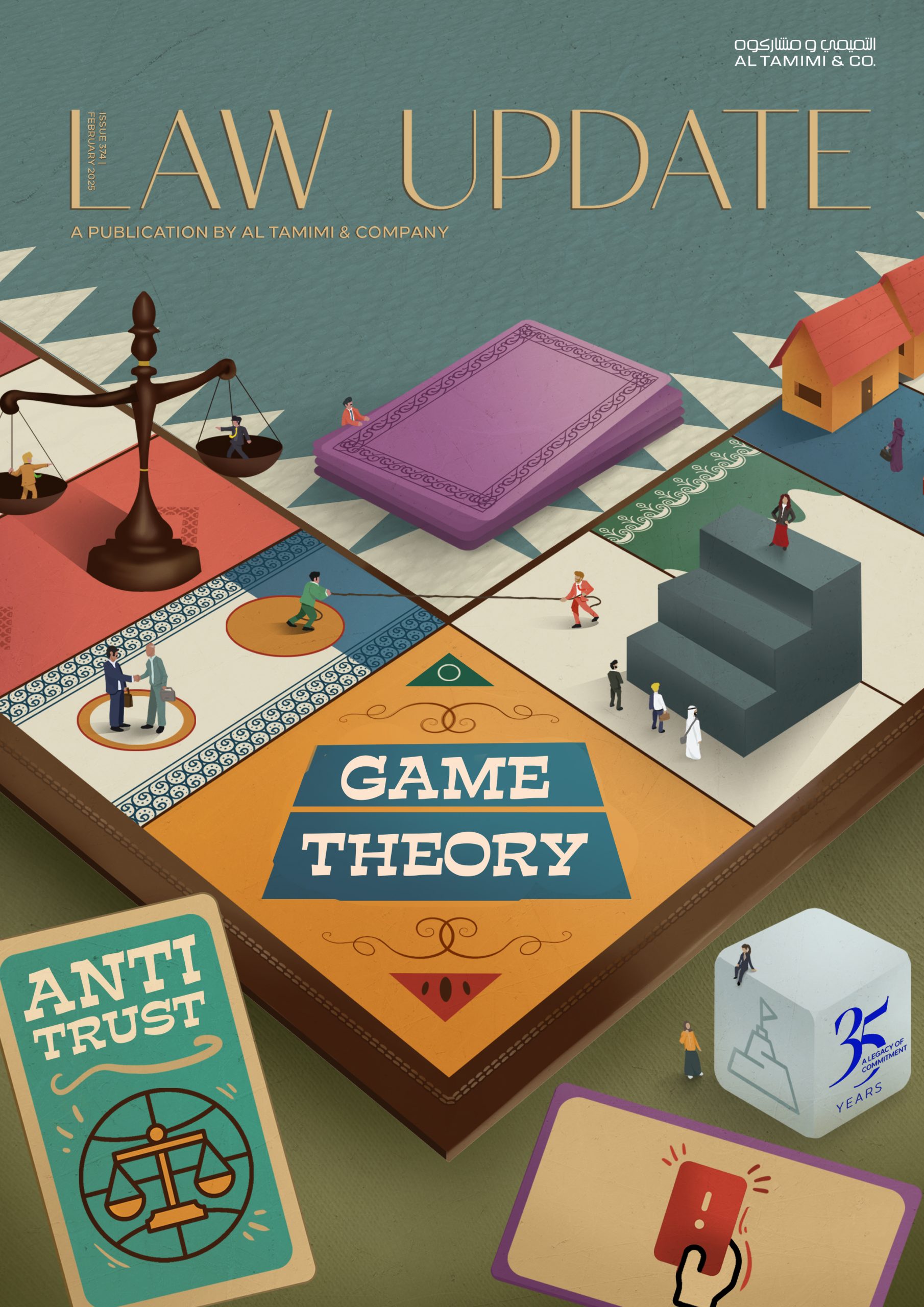- Arbitration
- Banking & Finance
- Capital Markets
- Commercial
- Competition
- Construction & Infrastructure
- Corporate / Mergers & Acquisitions
- Corporate Services
- Corporate Structuring
- Digital & Data
- Dispute Resolution
- Employment & Incentives
- Family Business & Private Wealth
- Innovation, Patents & Industrial Property (3IP)
- Insurance
Find a Lawyer
Book an appointment with us, or search the directory to find the right lawyer for you directly through the app.
Find out more
Game Theory


2025 is set to be a game-changer for the MENA region, with legal and regulatory shifts from 2024 continuing to reshape its economic landscape. Saudi Arabia, the UAE, Egypt, Iraq, Qatar, and Bahrain are all implementing groundbreaking reforms in sustainable financing, investment laws, labor regulations, and dispute resolution. As the region positions itself for deeper global integration, businesses must adapt to a rapidly evolving legal environment.
Our Eyes on 2025 publication provides essential insights and practical guidance on the key legal updates shaping the year ahead—equipping you with the knowledge to stay ahead in this dynamic market.
The leading law firm in the Middle East & North Africa region.
A complete spectrum of legal services across jurisdictions in the Middle East & North Africa.
-
Practices
- All Practices
- Banking & Finance
- Capital Markets
- Commercial
- Competition
- Construction & Infrastructure
- Corporate / Mergers & Acquisitions
- Corporate Services
- Corporate Structuring
-
Sectors
-
Country Groups
-
Client Solutions
Today's news and tomorrow's trends from around the region.
17 offices across the Middle East & North Africa.
Our Services
 Back
Back
-
Practices
- All Practices
- Banking & Finance
- Capital Markets
- Commercial
- Competition
- Construction & Infrastructure
- Corporate / Mergers & Acquisitions
- Corporate Services
- Corporate Structuring
- Digital & Data
- Dispute Resolution
- Employment & Incentives
- Family Business & Private Wealth
- Innovation, Patents & Industrial Property (3IP)
- Insurance
- Intellectual Property
- Legislative Drafting
- Private Client Services
- Private Equity
- Private Notary
- Projects
- Real Estate
- Regulatory
- Tax
- Turnaround, Restructuring & Insolvency
- White Collar Crime & Investigations
-
Sectors
-
Country Groups
-
Client Solutions
- Law Firm
- /
- Insights
- /
- Law Update
- /
- June – July 2016
- /
- DIFC Court Judgment Enforced in Australia
DIFC Court Judgment Enforced in Australia
Sana Saleem - Associate - Digital & Data
Tarek Shrayh
June – July 2016
The Supreme Court of New South Wales, Australia, issued an order recognising and enforcing the DIFC Courts judgment issued by Justice Sir Richard Field in Legatum Limited v Arif Salim (CFI 027/2014).
The reciprocal enforceability of court judgments is noteworthy where it involves countries with close commercial ties, such as the UAE and Australia. The UAE is Australia’s largest trading partner in the Middle East and the 15th largest overall. Australia’s commercial profile in the UAE is significant, with over 360 Australian companies having a physical presence in the UAE.
These close commercial ties between the two countries were a principal reason for the signing of a Memorandum of Guidance between the DIFC Courts and the Federal Court of Australia. This document, which is not legally binding, was intended to generate further confidence in the commercial relationship between the two countries by facilitating the mutual enforcement of money judgments. The Memorandum entered into by the two courts was signed by their respective Chief Justices during a ceremony in Melbourne, Australia in March 2014.
Following on from this, in March 2016, the Supreme Court of New South Wales ordered the recognition and enforcement of the Legatum judgment against the Defendant, an Australian citizen.
The Claimant, represented by Al Tamimi & Company, originally brought a claim in the DIFC Courts against its former employee, the Defendant, for deliberately and wrongfully interfering with its IT system.
The DIFC Courts gave judgment in favour of the Claimant and concluded that the Defendant was the perpetrator of the IT incident. The Defendant was ordered to pay the Claimant significant monetary damages.
Subsequently, the Claimant sought to have the DIFC Court judgment against the Defendant recognised and enforced in the courts of the Defendant’s country of residence. The Supreme Court of New South Wales, discussing the principles governing the enforcement of judgments at common law, listed the following four conditions that must be satisfied in order for a foreign judgment to be enforced by an Australian court:
- The foreign court must have exercised a jurisdiction that Australian courts recognise.
- The foreign judgment must be final and conclusive.
- There must be an identity of the parties.
- If the judgment is in personam, the judgment must be for a fixed sum.
Accordingly, the Supreme Court found that the four relevant conditions had been satisfied as follows:
- The jurisdiction that the DIFC Courts had exercised was a jurisdiction recognised by the Supreme Court and the Defendant had submitted to that jurisdiction by his appearance as a party in the proceedings in which he defended the claim. Furthermore, the Defendant did not challenge the DIFC Courts’ jurisdiction at any point in the proceedings.
- The DIFC Courts’ judgment and orders are final and are not conditional and have not been stayed or set aside.
- The parties to these and the Dubai proceedings were identical.
- The judgment was for a fixed sum.
On this basis, the Supreme Court ordered the recognition and enforcement of the DIFC Courts’ judgment. The judgment of the Supreme Court represents an encouraging precedent for the recognition and enforcement of DIFC Courts’ judgments in other common law jurisdictions.
Stay updated
To learn more about our services and get the latest legal insights from across the Middle East and North Africa region, click on the link below.


